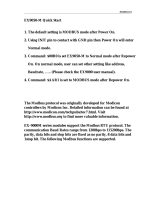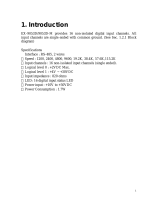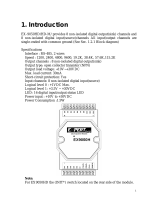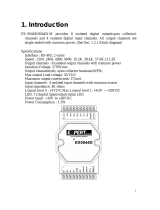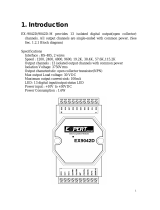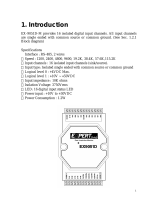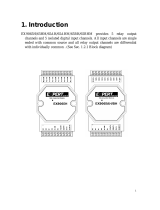Page is loading ...

tM Series DIO User Manual, Rev: A1.4 7PH-013-A14
1
tM Series DIO
User Manual
Warranty
All products manufactured by ICP DAS are under
warranty regarding defective materials for a period of one
year from the date of delivery to the original purchaser.
Warning
ICP DAS assumes no liability for damages resulting
from the use of this product. ICP DAS reserves the right to
change this manual at any time without notification. The
information furnished by ICP DAS is believed to be accurate
and reliable. However, no responsibility is assumed by ICP
DAS for its use, or for any infringements of patents or other
rights of third parties resulting from its use.
Copyright
Copyright 2012 ICP DAS. All rights reserved.
Trademark
The names used for identification only may be registered
trademarks of their respective companies.
Date: 2018/12/28

tM Series DIO User Manual, Rev: A1.4 7PH-013-A14
2
Table of Contents
1. Introduction ...................................................................................... 5
1.1 More Information ..................................................................... 6
1.2 Terminal Assignment ............................................................... 7
1.3 Specifications ......................................................................... 16
1.3.1 I/O Specifications .......................................................... 16
1.3.2 System Specifications ................................................... 20
1.4 Block Diagrams ...................................................................... 21
1.4.1 Block Diagram for the tM-C8 ....................................... 21
1.4.2 Block Diagram for the tM-P8 ....................................... 21
1.4.3 Block Diagram for the tM-PDW8 ................................. 22
1.4.4 Block Diagram for the tM-P4A4 .................................. 22
1.4.5 Block Diagram for the tM-P4C4 ................................... 23
1.4.6 Block Diagram for the tM-P3POR3 ............................. 23
1.4.7 Block Diagram for the tM-P3R3 ................................... 24
1.4.8 Block Diagram for the tM-PD3R3 ................................ 24
1.4.9 Block Diagram for the tM-R5 ....................................... 25
1.5 Dimensions ............................................................................. 26
1.6 Wiring ..................................................................................... 27
1.6.1 tM-C8 wiring ................................................................. 27
1.6.2 tM-P8 wiring ................................................................. 27
1.6.3 tM-PDW8 wiring .......................................................... 28
1.6.4 tM-P4A4 wiring ............................................................ 28
1.6.5 tM-P4C4 wiring............................................................. 29
1.6.6 tM-P3POR3 wiring ....................................................... 29
1.6.7 tM-P3R3 wiring............................................................. 30
1.6.8 tM-PD3R3 wiring .......................................................... 30
1.6.9 tM-R5 wiring ................................................................. 30
1.6.10 Wiring Recommendations ........................................... 31
1.7 Quick Start .............................................................................. 32
1.8 Default Settings ...................................................................... 33
1.9 Configuration Tables .............................................................. 34
1.10 DIO Active States ................................................................. 37
1.11 Mounting .............................................................................. 38
1.11.1 Din-Rail Mounting ...................................................... 38

tM Series DIO User Manual, Rev: A1.4 7PH-013-A14
3
1.12 Technical Support ................................................................ 40
2. DCON Protocol .............................................................................. 41
2.1 %AANNTTCCFF .................................................................. 44
2.2 #** .......................................................................................... 47
2.3 #AA00(Data) .......................................................................... 48
2.4 #AA0A(Data) ......................................................................... 50
2.5 #AA0B(Data) ......................................................................... 52
2.6 #AA1cDD ............................................................................... 54
2.7 #AAAcDD .............................................................................. 56
2.8 #AABcDD .............................................................................. 58
2.9 #AAN ..................................................................................... 60
2.10 $AA2 .................................................................................... 62
2.11 $AA4 .................................................................................... 64
2.12 $AA5 .................................................................................... 66
2.13 $AA6 .................................................................................... 68
2.14 $AAC .................................................................................... 70
2.15 $AACN ................................................................................. 72
2.16 $AAF .................................................................................... 74
2.17 $AALS .................................................................................. 75
2.18 $AAM ................................................................................... 77
2.19 $AAP .................................................................................... 78
2.20 $AAPN ................................................................................. 80
2.21 @AA ..................................................................................... 82
2.22 @AA(Data) .......................................................................... 84
2.23 ~AAO(Name) ....................................................................... 86
2.24 ~** ........................................................................................ 88
2.25 ~AA0 .................................................................................... 89
2.26 ~AA1 .................................................................................... 91
2.27 ~AA2 .................................................................................... 93
2.28 ~AA3EVV ............................................................................ 95
2.29 ~AA4V ................................................................................. 97
2.30 ~AA5V ................................................................................. 99
2.31 ~AAD ................................................................................. 101
2.32 ~AADVV ........................................................................... 103
2.33 ~AARD ............................................................................... 105
2.34 ~AARDVV ......................................................................... 107
3. Modbus RTU Protocol ................................................................. 109
3.1 01 (0x01) Read Coils............................................................ 110

tM Series DIO User Manual, Rev: A1.4 7PH-013-A14
4
3.2 02 (0x02) Read Discrete Inputs ........................................... 112
3.3 03 (0x03) Read Multiple Registers ...................................... 113
3.4 04 (0x04) Read Multiple Input Registers ............................. 114
3.5 05 (0x05) Write Single Coils ............................................... 115
3.6 15 (0x0F) Write Multiple Coils ........................................... 117
3.7 70 (0x46) Read/Write Module Settings ............................... 119
3.7.1 Sub-function 00 (0x00) Read module name ............... 120
3.7.2 Sub-function 04 (0x04) Set module address ............... 121
3.7.3 Sub-function 05 (0x05) Read communication settings
.............................................................................................. 122
3.7.4 Sub-function 06 (0x06) Set communication settings.. 123
3.7.5 Sub-function 32 (0x20) Read firmware version ......... 125
3.7.6 Sub-function 33 (0x21) Set digital input counter trigger
edge ....................................................................................... 126
3.7.7 Sub-function 34 (0x22) Read digital input counter
trigger edge value ................................................................. 127
3.7.8 Sub-function 39 (0x27) Set the power-on value ......... 128
3.7.9 Sub-function 40 (0x28) Read the power-on value ...... 129
3.7.10 Sub-function 41 (0x29) Set DI/O active states ......... 130
3.7.11 Sub-function 42 (0x2A) Read DI/O active states ..... 132
3.8 Modbus Address Mappings .................................................. 133
4. Troubleshooting ............................................................................ 136
4.1 Communicating with the module ......................................... 137
A. Appendix ..................................................................................... 138
A.1 INIT Mode ........................................................................... 138
A.2 Dual Watchdog Operation ................................................... 140
A.3 Frame Ground ...................................................................... 141
A.4 Reset Status ......................................................................... 142
A.5 Safe Value and Power-on Value of Digital Output ............ 143
A.6 Latched Digital Input ........................................................... 144
A.7 DN Module .......................................................................... 145
A.7.1 DN-SSR4 .................................................................... 146
A.7.2 DN-PR4 ...................................................................... 147
A.7.3 RM-104, RM-108, and RM-116 ................................ 148
A.7.4 RM-204, RM-208, RM-216 ....................................... 149

tM Series DIO User Manual, Rev: A1.4 7PH-013-A14
5
1. Introduction
The tM series is a family of network data acquisition and
control modules, providing digital input/output and counter
functions. The modules can be remotely controlled using a set
of commands, which we call the DCON protocol, or the
standard Modbus protocol. Communication between the
module and the host is via an RS-485/RS-232 bi-directional
serial bus standard. Baud Rates are software programmable
and transmission speeds of up to 115.2 Kbps can be selected.
The tM series feature a new design for the frame ground
and INIT switch as shown in the figure. The frame
ground provides enhanced static protection (ESD)
abilities and ensures the module is more reliable. The
INIT switch allows easier access to INIT mode. Please
refer to Sections A.1 and A.3 for more details.
The tM series modules support TTL signal, photo-isolated
digital input, relay contact output, solid-state relay output, and
open-collector output.

tM Series DIO User Manual, Rev: A1.4 7PH-013-A14
6
1.1 More Information
For details of INIT mode operation, please refer to
Section A.1 INIT Mode.
For details of module watchdog and host watchdog,
please refer to Section A.2 Dual Watchdog Operation.
For details of ESD protection and grounding, please
refer to Section A.3 Frame Ground.
There is a way to check whether the module is reset,
please refer to Section A.4 Reset Status for details.
For details of the safe value and power-on value of the
digital output, please refer to Section A.5 Safe Value and
Power-on Value of Digital Output.
The module with digital inputs provides the latched
digital inputs, please refer to Section A.6 Latched Digital
Input for details.
For details of the I/O extension modules, please refer to
Section A.7 DN Module.

tM Series DIO User Manual, Rev: A1.4 7PH-013-A14
7
1.2 Terminal Assignment

tM Series DIO User Manual, Rev: A1.4 7PH-013-A14
8

tM Series DIO User Manual, Rev: A1.4 7PH-013-A14
9

tM Series DIO User Manual, Rev: A1.4 7PH-013-A14
10

tM Series DIO User Manual, Rev: A1.4 7PH-013-A14
11

tM Series DIO User Manual, Rev: A1.4 7PH-013-A14
12

tM Series DIO User Manual, Rev: A1.4 7PH-013-A14
13

tM Series DIO User Manual, Rev: A1.4 7PH-013-A14
14
tM-P3POR3

tM Series DIO User Manual, Rev: A1.4 7PH-013-A14
15
tM-R5

tM Series DIO User Manual, Rev: A1.4 7PH-013-A14
16
1.3 Specifications
1.3.1 I/O Specifications
Digital Input and Digital Output Module
Module Name
tM-P4A4
tM-P4C4
tM-C8
tM-P8
Digital Input/Counter
Input Channels
4
4
No Digital Input
8
Type
Wet Contact (Sink)
Wet Contact (Source)
Wet Contact (Sink,
Source)
On Voltage Level
+3.5 ~ +50 VDC
+3.5 ~ +50 VDC
+3.5 ~ +50 VDC
Off Voltage Level
+1 VDC max.
+1 VDC max.
+1 VDC max.
Input Impedance
10 KΩ, 0.66 W
10 KΩ, 0.66 W
10 KΩ, 0.66 W
Counters
Channels
4
4
8
Max. Count
65535 (16-bit)
65535 (16-bit)
65535 (16-bit)
Max. Frequency
100 Hz
100 Hz
100 Hz
Min. Pulse Width
5 ms
5 ms
5 ms
Over-voltage Protection
70 VDC
70 VDC
70 VDC
Digital Output
Output Channels
4
4
8
No Digital Output
Type
Isolated Open Emitter
(Source)
Isolated Open Collector
(Sink)
Isolated Open Collector
(Sink)
Max. Load Current
650 mA/channel
700 mA/channel
700 mA/channel
Load Voltage
+10 ~ +40 VDC
+3.5 ~ +50 VDC
+3.5 ~ +50 VDC
Over-voltage Protection
47 VDC
60 VDC
60 VDC
Overload Protection
Yes
Yes
Yes
Short Circuit Protection
1.4 A, Yes
1.4 A, Yes
1.4 A, Yes
Power-on Value
Yes, Programmable
Yes, Programmable
Yes, Programmable
Safe Value
Yes, Programmable
Yes, Programmable
Yes, Programmable
Power Requirements
Reverse Polarity Protection
Yes
Powered from Terminal
Block
Yes, 10 ~ 30 VDC
Consumption
0.5 W max
0.5 W max
0.8 W max
0.4 W max

tM Series DIO User Manual, Rev: A1.4 7PH-013-A14
17
Digital Input Module
Module Name
tM-P8
tM-PDW8
Digital Input/Counter
Input Channels
8
4
Type
Wet Contact (Sink,
Source)
Wet Contact (Source)
+Dry Contact(Source)
Wet Contact
On Voltage
Level
+3.5 ~ +50 VDC
+3.5 ~ +50 VDC
Off Voltage
Level
+1 VDC max.
+1 VDC max.
Dry Contact
On Voltage
Level
-
Close to GND
Off Voltage
Level
-
Open
Input Impedance
10 KΩ, 0.5 W
10 KΩ, 0.5 W
Counters
Channels
8
8
Max. Count
65535 (16-bit)
65535 (16-bit)
Max. Frequency
100 Hz
100 Hz
Min. Pulse Width
5 ms
5 ms
Over-voltage Protection
± 70 VDC
± 70 VDC
Power Requirements
Reverse Polarity Protection
Yes
Powered from Terminal
Block
Yes, 10 ~ 30 VDC
Consumption
0.2 W max
0.43 W max

tM Series DIO User Manual, Rev: A1.4 7PH-013-A14
18
PhotoMOS Relay Output Module
Module Name
tM-P3POR3
PhotoMOS Relay Output
Output Channels
3
Type
PhotoMOS Relay
Operating Load Voltage Range
80 V (AC peak or DC)
Continuous. Load Current
1 A max.
Peak Load Current
3 A (1 ms, 1 shot)
Output Off State Leakage Current
1 uA
Operate Time
5 ms (max.)
Release Time
0.5 ms (max.)
Electrical Endurance
Long Life and No Spike
Power-on Value
Yes, Programmable
Safe Value
Yes, Programmable
Digital Input/Counter
Input Channels
3
Type
Wet Contact (Sink, Source)
On Voltage Level
+3.5 ~ +50 VDC
Off Voltage Level
+1 VDC max.
Input Impedance
10 KΩ, 0.66 W
Counters
Channels
3
Max. Count
65535 (16-bit)
Max. Input Frequency
100 Hz
Min. Pulse Width
5 ms
Over-voltage Protection
70 VDC
Power Requirements
Reverse Polarity Protection
Yes
Powered from Terminal Block
Yes, 10 ~ 30 VDC
Consumption
0.4 W max

tM Series DIO User Manual, Rev: A1.4 7PH-013-A14
19
Relay Output Module
Module Name
tM-P3R3
tM-PD3R3
tM-R5
Relay Output
Output Channels
3
3
5
Type
Power Relay, Form A (SPST
N.O.)
Power Relay, Form A (SPST
N.O.)
Power Relay, Form A (SPST
N.O.)
Operating Voltage Range
250 VAC or 30 VDC
250 VAC or 30 VDC
250 VAC or 30 VDC
Max. Load Current
5 A
5 A
5 A
Operate Time
6 ms
6 ms
6 ms
Release Time
3 ms
3 ms
3 ms
Electrical
Life
(Resistive
load)
VDE
5 A @250 VAC 30,000 ops (10
ops/minute) at 75°C
5 A @250 VAC 30,000 ops (10
ops/minute) at 75°C
5 A @250 VAC 30,000 ops (10
ops/minute) at 75°C
5 A @30 VDC 70,000 ops (10
ops/minute) at 75°C
5 A @30 VDC 70,000 ops (10
ops/minute) at 75°C
5 A @30 VDC 70,000 ops (10
ops/minute) at 75°C
UL
5 A @250 VAC/30 VDC 6,000
ops
5 A @250 VAC/30 VDC 6,000
ops
5 A @250 VAC/30 VDC 6,000
ops
3 A @250 VAC/30 VDC
100,000 ops
3 A @250 VAC/30 VDC
100,000 ops
3 A @250 VAC/30 VDC
100,000 ops
Mechanical Life
20,000,000 ops at no load (300
ops/minute)
20,000,000 ops at no load (300
ops/minute)
20,000,000 ops at no load (300
ops/minute)
Power-on Value
Yes, Programmable
Yes, Programmable
Yes, Programmable
Safe Value
Yes, Programmable
Yes, Programmable
Yes, Programmable
Digital Input/Counter
Input Channels
3
3
No Digital Input
Type
Wet Contact (Sink, Source)
Dry Contact (Source)
Wet Contact
On Voltage
Level
+3.5 ~ +50 VDC
Off Voltage
Level
+1 VDC max.
Dry Contact
On Voltage
Level
Close to GND
Off Voltage
Level
Open
Counters
Max. Count
65535 (16-bit)
65535 (16-bit)
Max. Input
Frequency
100 Hz
100 Hz
Min. Pulse
Width
5 ms
5 ms
Input Impedance
10 KΩ, 0.5 W
NA
Over-voltage Protection
70 VDC
NA
Power Requirements
Reverse Polarity Protection
Yes
Powered from Terminal Block
Yes, 10 ~ 30 VDC
Consumption
0.8 W max
0.9 W max
1.0 W max

tM Series DIO User Manual, Rev: A1.4 7PH-013-A14
20
1.3.2 System Specifications
Communication
Interface
RS-485
Format
(N, 8, 1), (N, 8, 2), (O, 8, 1), (E, 8, 1)
Baud Rate
1200 ~ 115200 bps
Protocol
DCON, Modbus RTU, Modbus ASCII
Dual Watchdog
Yes, Module (2.3 seconds),
Communication (Programmable)
LED Indicators
Power
1 LED as Power Indicator
Isolation
Intra-module Isolation,
Field-to-logic
3750 VDC
EMS Protection
ESD (IEC 61000-4-2)
±4 kV contact for each terminal
±8 kV air for random point
EFT (IEC 61000-4-4)
±4 kV for power
Mechanical
Dimensions (W x L x H)
52 mm x 27 mm x 98 mm
Installation
DIN-Rail Mounting
Environment
Operating Temperature
-25 ~ +75 °C
Storage Temperature
-30 ~ +75 °C
Humidity
10 ~ 95% RH, non-condensing
/
